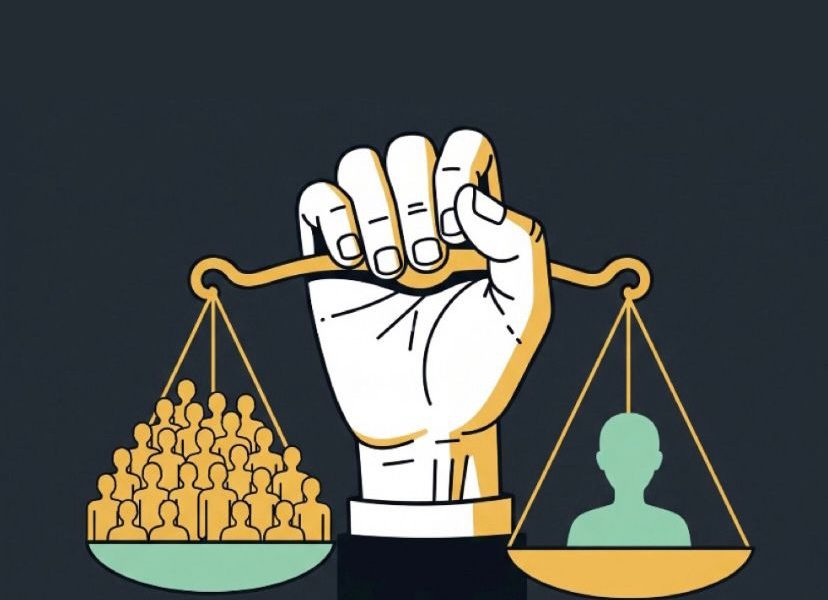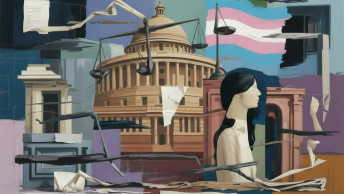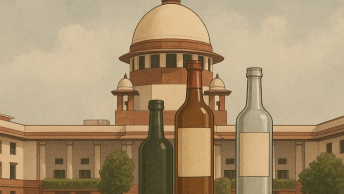Introduction
For a truly pluralistic society, the mere absence of a state religion is insufficient; proactive policies to mitigate majoritarianism should be implemented, while recognising and safeguarding minority groups. The recently passed judgment of Ramesh Baghel V. State of Chhattisgarh (Ramesh Baghel) exemplifies the Judiciary’s challenges in upholding these responsibilities. This case centred on an Apostolic Christian tribal family’s right to inter their father in their ancestral village, Chhindwada. This claim was then opposed by the Gram Panchayat, maintaining that due to local customs, only Hindu members were permitted burial in the local graveyard. The Chhattisgarh High Court affirmed this stance, mandating the burial to take place in the Christian cemetery of Karkapal, a village 20-25 kms away. Thereby prompting a Special Leave Petition (SLP) to the Apex court, a split verdict enforcing the panchayat’s exclusionary rules ultimately upheld the High Court’s order.
The author believes that Justice Satish Chandra Sharma’s opinion prioritizing administrative convenience and local customs effectively legitimizes exclusionary practices, further endorsing religious segregation in the pretext of bureaucratic compliance.
This article presents a critical analysis on the passed judgment, arguing Justice B. V. Nagarathna’s dissent ought to have prevailed. Firstly, the Court’s decision violates fundamental rights, undermines constitutional morality and highlights the court’s ignorance of material facts. Secondly, it undermines the principle of Article 142 of delivering “Complete Justice” while diverging from past domestic and international standards. Lastly, drawing on Article 18 of the International Covenant on Civil and Political Rights (ICCPR), the author proposes a three-pronged test to mitigate obstacles faced in implementing balanced regulations for religious freedom.
The Divide Between Majoritarian Convenience & Constitutional Morality
The initial divided verdict in this case exhibited a stark contrast between subservience to majority opinion and the jurisprudence of fundamental rights.
- J. Sharma risks reducing the deceased’s fundamental rights to the narrow question of “place”, while violating 5 core constitutional tenets. Apart from the violations of Articles 14, 15(1), and 21 discussed by J. Nagarathna, this judgment also violates Article 17. In forcing the family to go to a different place for the burial, it permits social exclusion as observed in P. Rathinam v. State of Tamil Nadu. Consequently, the restrictions imposed on the appellants in practicing their faith violate the freedoms to religion protected under Article 25.
Consistently, significant importance has been awarded to ensuring burials are held in consonance with the beliefs of the deceased. In S. Sethu Raja v. Chief Secretary, Government authorities were instructed to repatriate the deceased from Malaysia, to ensure that the relatives could conduct last rites according to religious customs. Evidently, the divergence between the prevailing views on the importance of Burial traditions and customs and the order of this judgment warrants further inquiry.
The refusal towards the burial being rooted in the long-standing customs of the village’s Hindu members to maintain religious purity and religious prejudice towards them, serves as an illustration of the judgment’s deference to majoritarian bias. By stating concern for public order and hygiene, the court risks endorsing religionism, transgressing the concept of constitutional morality, put forward in Navtej Singh Johar v. Union of India. Articulated as the “soul of the constitution”, this concept posits that the judicial system must ensure the Constitution functions as a living document, upholding fundamental rights even against long-standing majoritarian moral beliefs.
Aligning with this concept, J. Nagarathna permitted burial in the family’s private land, a right protected under Article 300A allowing individuals to use their private property for religious purposes. In her dissent, she further instructed the local authorities to demarcate exclusive sites for Christian burials in the future, a contention sidestepped in the operative order. Pivoting on the protection of the rights of the deceased, her transformative analysis attests to the prioritization of individual constitutional rights over majoritarian preferences and administrative ease.
Despite the procedural nature of SLP’s only involving the addressal of legal errors and miscarriages of justice, J. Nagarathna in her proactive analysis reappraised the disputed facts of the case. Stating, “However, there is no material produced before this Court to show that the burial of Christians deceased at Chhindwada village has taken place at Karkapal… nor has any material been supplied to suggest such custom.” she upholds the view established in Mekala Sivaiah vs The State Of Andhra Pradesh, wherein it was held that in cases of injustice due to misapprehension or ignoring material evidence, it is the duty of the court to interfere and reappreciate the facts. Her reliance on submitted evidence producing that the same petitioner’s ancestors being Christian converts as well were permitted burial in the common ground that his father was being denied burial in, further proves the unsoundness of the present judgment.
Nevertheless, the final judgment was passed adhering to J. Sharma’s opinion upon the invocation of Article 142 to avoid further delays in the interment of the appellant’s father. In Prem Chand Garg v. Excise Commissioner, U.P., the Court’s powers under this provision were narrowed, asserting that any order passed under Article 142 must conform to fundamental rights. However, the final judgment being constitutionally violative (as argued previously) not only goes against this precedent but also violates the underlying principle of the provision of delivering “complete justice”.
Quoting the Gram Panchayats rules, it was held that graves “cannot be arbitrarily constructed and must be established in designated areas identified by the Gram Panchayat.” No such area within the village was established by the Panchayat. Since no material was provided supporting Karkapal’s prescription as the burial grounds, and there were no previous instances of Christians from the Chhindwada village using those grounds, J. Sharma’s decision thereby prioritizes administrative convenience and public order while neglecting the protection of constitutional rights. Additionally, by instructing state-provided ambulance services to transport the father’s body, he provided a band-aid solution to a problem deeply embedded in religious and cultural identity.
Interestingly, in Sartik Korram v. State of Chattisgarh, the Chattisgarh High Court passed an order in stark dissonance with the present judgment, despite being under similar circumstances. In this case, the court permitted the burial of a Christian convert in the same Bastar district, affirming his constitutional right to a dignified burial in his birthplace under Article 21. This contradiction, along with the reliance of the majority’s opinion on unsubstantiated grounds of public order thereby expose the fundamentally flawed line of reasoning in this judgment.
Dissonance with International Standards
Apart from being inherently unconstitutional, the arbitrariness of this judgment is also evident from its dissonance with international standards. The United Nations Economic and Social Council (ECOSOC), in its guidelines for remedies and reparations for victims of Violations of International Humanitarian Law, instructs the reburial of discovered bodies per the presumed wishes of the victim, or the cultural practices of the families. Additionally, the United Nations too has repeatedly condemned the four-decade-long persecution of Baha’is by Iran, denouncing their violation of Baha’i Burial Rights (here, here, here). Vide multiple passed resolutions (here, here), the UN General Assembly has condemned the destruction and denial of respectful burials for the Baha’is, as well as the demarcation of grave sites for their interment, disregarding their sacred funeral practices.
The outcome of Ramesh Baghel diverges from both Indian and International standards, which underscore the necessity of respecting burial rights following the cultural and religious beliefs of communities, especially given the pluralistic nature of the Indian society.
Three-Pronged Test Deriving from ICCPR
Article 18 of the ICCPR grants individuals the right to manifest and practice their religion of choice. In the exercise of these rights, individuals are expected to have respect for the rights of others, ensuring collective welfare. Therefore, limitations can be imposed by the state when people’s actions, underscored by their religious beliefs, impact the rights of others. The mere existence of freedom of conscience of religion does not confer on us the right to unrestricted conscientious objection, especially when such value-based objection infringes upon the rights of others to burial dignity and non-discrimination. Consequently, when this freedom is asserted in such a way, the state must ensure the protection of everyone’s rights.
While the concept of proportionality in justifying limitations on religious practices is integral in a pluralistic country like India, its application faces challenges of conflicting religious interests. In the absence of a structured framework, the possibilities of courts drawing upon beliefs of public sentiment and maintenance of public order become more likely, leading to arbitrary limitations on religious freedoms of minorities, as seen in Ramesh Baghel. To address these issues, the author proposes a structured three-pronged test that will help in determining whether an action protected under religious freedoms is justified or not, reinforcing the judiciary’s duty to balance individual rights and religious plurality.
- Real & Demonstrable Harm: The author suggests that vague justifications to impose restrictions such as public order and sentiment should be rejected. Instead, real & demonstrable harm, as articulated in the Harm Principle by J.S. Mill, should be mandated, requiring tangible proof. This ensures that the fundamental right of religious freedom is curtailed only when necessary, preventing reliance on speculative discomfort of others.
- Substantial Burden Analysis: Upon demonstration of a Real Harm, the second prong of the test is anchored in the Substantial Burden Doctrine, borrowed from US Jurisprudence. This theory ensures no government actions impose a Substantial Burden on Individuals to perform acts inconsistent with their religious beliefs. Ensuring that courts safeguard religious rights by acceding to the Individual’s sincere beliefs, such an approach prevents judicial interference based on theological assumptions. This centres the judiciary’s reasoning in similar cases on the bereaved family’s religious obligations, rather than prevailing dominant religious customs.
- The Principle of Adequate Alternatives & Social Justice Frameworks: Restrictions imposed need to be an Adequate Alternative to the religious beliefs of the Individuals and must be the least restrictive means available. Policies made to govern religious practices should emphasize democratic accountability, ensuring that the formulated regulations are developed through transparent and justified reasoning and work towards awarding equitable freedom for religious expression to all communities. The state should be compelled to explain why the burial could not occur in the family’s private land, and how the alternative provided was inferred to be inclusive and equitable. This will guarantee that regulations imposed are free from arbitrariness and majoritarianism, protecting minority rights and cultivating societal trust in governance.
Conclusion
The Ramesh Baghel case highlights the importance of maintaining a balance between majoritarian customs and constitutional rights, with the final verdict exposing judicial flaws validating exclusionary practices under the guise of judicial urgency and maintaining public order. However, the dissent by J. Nagarathna offers a crucial counterbalance, reaffirming the state’s duty to uphold constitutional morality over societal morality.
The three-pronged test proposed in this article provides a means to operationalise the concepts put forward in her dissent, ensuring that any limitations imposed on religious freedom are rooted in real & demonstrable harm, and are justly balanced with adequate alternatives that do not infringe religious beliefs. Adopting such a meticulous analysis into judicial review and policymaking will ensure that restrictions imposed on religious freedoms meet the threshold of necessity and proportionality, marking a transformative shift from arbitrary and majoritarian practices to a more dignity and rights-respecting approach.
Namya Nanda is a third-year student at Rajiv Gandhi National University of Law.
[Ed Note: The piece is edited by Hamza Khan and published by Vedang Chouhan]







Fantastic read! I really appreciate how clearly you explained the topic—your writing not only shows expertise but also makes the subject approachable for a wide audience. It’s rare to come across content that feels both insightful and practical at the same time. At explodingbrands.de we run a growing directory site in Germany that features businesses from many different categories. That’s why I truly value articles like yours, because they highlight how knowledge and visibility can create stronger connections between people, services, and opportunities.Keep up the great work—I’ll definitely be checking back for more of your insights!
Excellent work on this ultimate guide! every paragraph is packed with value. It’s obvious a lot of research and love went into this piece. If your readers want to put these 7 steps into action immediately, we’d be honoured to help: https://meinestadtkleinanzeigen.de/ – Germany’s fastest-growing kleinanzeigen & directory hub. • 100 % free listings • Auto-sync to 50+ local citation partners • Instant push to Google Maps data layer Drop your company profile today and watch the local calls start rolling in. Keep inspiring, and thanks again for raising the bar for German SEO content!
Excellent work on this ultimate guide! every paragraph is packed with value. It’s obvious a lot of research and love went into this piece. If your readers want to put these 7 steps into action immediately, we’d be honoured to help: https://meinestadtkleinanzeigen.de/ – Germany’s fastest-growing kleinanzeigen & directory hub. • 100 % free listings • Auto-sync to 50+ local citation partners • Instant push to Google Maps data layer Drop your company profile today and watch the local calls start rolling in. Keep inspiring, and thanks again for raising the bar for German SEO content!
Excellent work on this ultimate guide! every paragraph is packed with value. It’s obvious a lot of research and love went into this piece. If your readers want to put these 7 steps into action immediately, we’d be honoured to help: https://meinestadtkleinanzeigen.de/ – Germany’s fastest-growing kleinanzeigen & directory hub. • 100 % free listings • Auto-sync to 50+ local citation partners • Instant push to Google Maps data layer Drop your company profile today and watch the local calls start rolling in. Keep inspiring, and thanks again for raising the bar for German SEO content!
Excellent work on this ultimate guide! every paragraph is packed with value. It’s obvious a lot of research and love went into this piece. If your readers want to put these 7 steps into action immediately, we’d be honoured to help: https://meinestadtkleinanzeigen.de/ – Germany’s fastest-growing kleinanzeigen & directory hub. • 100 % free listings • Auto-sync to 50+ local citation partners • Instant push to Google Maps data layer Drop your company profile today and watch the local calls start rolling in. Keep inspiring, and thanks again for raising the bar for German SEO content!
Excellent work on this ultimate guide! every paragraph is packed with value. It’s obvious a lot of research and love went into this piece. If your readers want to put these 7 steps into action immediately, we’d be honoured to help: https://meinestadtkleinanzeigen.de/ – Germany’s fastest-growing kleinanzeigen & directory hub. • 100 % free listings • Auto-sync to 50+ local citation partners • Instant push to Google Maps data layer Drop your company profile today and watch the local calls start rolling in. Keep inspiring, and thanks again for raising the bar for German SEO content!
Excellent work on this ultimate guide! every paragraph is packed with value. It’s obvious a lot of research and love went into this piece. If your readers want to put these 7 steps into action immediately, we’d be honoured to help: https://meinestadtkleinanzeigen.de/ – Germany’s fastest-growing kleinanzeigen & directory hub. • 100 % free listings • Auto-sync to 50+ local citation partners • Instant push to Google Maps data layer Drop your company profile today and watch the local calls start rolling in. Keep inspiring, and thanks again for raising the bar for German SEO content!
Excellent work on this ultimate guide! every paragraph is packed with value. It’s obvious a lot of research and love went into this piece. If your readers want to put these 7 steps into action immediately, we’d be honoured to help: https://meinestadtkleinanzeigen.de/ – Germany’s fastest-growing kleinanzeigen & directory hub. • 100 % free listings • Auto-sync to 50+ local citation partners • Instant push to Google Maps data layer Drop your company profile today and watch the local calls start rolling in. Keep inspiring, and thanks again for raising the bar for German SEO content!
Excellent work on this ultimate guide! every paragraph is packed with value. It’s obvious a lot of research and love went into this piece. If your readers want to put these 7 steps into action immediately, we’d be honoured to help: https://meinestadtkleinanzeigen.de/ – Germany’s fastest-growing kleinanzeigen & directory hub. • 100 % free listings • Auto-sync to 50+ local citation partners • Instant push to Google Maps data layer Drop your company profile today and watch the local calls start rolling in. Keep inspiring, and thanks again for raising the bar for German SEO content!
Excellent work on this ultimate guide! every paragraph is packed with value. It’s obvious a lot of research and love went into this piece. If your readers want to put these 7 steps into action immediately, we’d be honoured to help: https://meinestadtkleinanzeigen.de/ – Germany’s fastest-growing kleinanzeigen & directory hub. • 100 % free listings • Auto-sync to 50+ local citation partners • Instant push to Google Maps data layer Drop your company profile today and watch the local calls start rolling in. Keep inspiring, and thanks again for raising the bar for German SEO content!
Fantastic read! I really appreciate how clearly you explained the topic—your writing not only shows expertise but also makes the subject approachable for a wide audience. It’s rare to come across content that feels both insightful and practical at the same time. At explodingbrands.de we run a growing directory site in Germany that features businesses from many different categories. That’s why I truly value articles like yours, because they highlight how knowledge and visibility can create stronger connections between people, services, and opportunities.Keep up the great work—I’ll definitely be checking back for more of your insights!
Fantastic read! I really appreciate how clearly you explained the topic—your writing not only shows expertise but also makes the subject approachable for a wide audience. It’s rare to come across content that feels both insightful and practical at the same time. At explodingbrands.de we run a growing directory site in Germany that features businesses from many different categories. That’s why I truly value articles like yours, because they highlight how knowledge and visibility can create stronger connections between people, services, and opportunities.Keep up the great work—I’ll definitely be checking back for more of your insights!
Fantastic read! I really appreciate how clearly you explained the topic—your writing not only shows expertise but also makes the subject approachable for a wide audience. It’s rare to come across content that feels both insightful and practical at the same time. At explodingbrands.de we run a growing directory site in Germany that features businesses from many different categories. That’s why I truly value articles like yours, because they highlight how knowledge and visibility can create stronger connections between people, services, and opportunities.Keep up the great work—I’ll definitely be checking back for more of your insights!
Fantastic read! I really appreciate how clearly you explained the topic—your writing not only shows expertise but also makes the subject approachable for a wide audience. It’s rare to come across content that feels both insightful and practical at the same time. At explodingbrands.de we run a growing directory site in Germany that features businesses from many different categories. That’s why I truly value articles like yours, because they highlight how knowledge and visibility can create stronger connections between people, services, and opportunities.Keep up the great work—I’ll definitely be checking back for more of your insights!
Fantastic read! I really appreciate how clearly you explained the topic—your writing not only shows expertise but also makes the subject approachable for a wide audience. It’s rare to come across content that feels both insightful and practical at the same time. At explodingbrands.de we run a growing directory site in Germany that features businesses from many different categories. That’s why I truly value articles like yours, because they highlight how knowledge and visibility can create stronger connections between people, services, and opportunities.Keep up the great work—I’ll definitely be checking back for more of your insights!
Fantastic read! I really appreciate how clearly you explained the topic—your writing not only shows expertise but also makes the subject approachable for a wide audience. It’s rare to come across content that feels both insightful and practical at the same time. At explodingbrands.de we run a growing directory site in Germany that features businesses from many different categories. That’s why I truly value articles like yours, because they highlight how knowledge and visibility can create stronger connections between people, services, and opportunities.Keep up the great work—I’ll definitely be checking back for more of your insights!
Fantastic read! I really appreciate how clearly you explained the topic—your writing not only shows expertise but also makes the subject approachable for a wide audience. It’s rare to come across content that feels both insightful and practical at the same time. At explodingbrands.de we run a growing directory site in Germany that features businesses from many different categories. That’s why I truly value articles like yours, because they highlight how knowledge and visibility can create stronger connections between people, services, and opportunities.Keep up the great work—I’ll definitely be checking back for more of your insights!
Fantastic read! I really appreciate how clearly you explained the topic—your writing not only shows expertise but also makes the subject approachable for a wide audience. It’s rare to come across content that feels both insightful and practical at the same time. At explodingbrands.de we run a growing directory site in Germany that features businesses from many different categories. That’s why I truly value articles like yours, because they highlight how knowledge and visibility can create stronger connections between people, services, and opportunities.Keep up the great work—I’ll definitely be checking back for more of your insights!